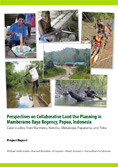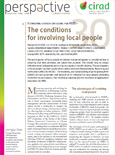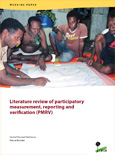
- PMRV
- Publications
Project Publications
No. 30. Estimating carbon emissions for Redd+ : The conditions for involving local people Abstract The participation of local people in climate change mitigation is considered key to ensuring that their priorities are taken into account. This should help to design effective social safeguards and to improve equity in benefit sharing. The participation of local people has been explored in carbon emission Measurement, Reporting and Verification (MRV) for REDD+. The feasibility and sustainability of participatory MRV (PMRV) are not automatic and depend on its relevance to local people (including incentives to participate), their technical capacity and the existence of appropriate structures for MRV. |
|||
|
|
|||
Literature review of participatory measurement, reporting and verification (PMRV) Abstract A literature review was conducted of participatory monitoring and existing PMRV approaches to identify strategies and conditions that support the development and implementation of sustainable PMRV in the REDD+ context. To identify data and processes that should be included in PMRV, we reviewed MRV requirements in the REDD+ context. The literature is analyzed to summarize the lessons learned from participatory monitoring, examine when, where and how PMRV has been developed and implemented, and identify any knowledge gaps. With Indonesia as our case study, we explored the feasibility of PMRV implementation and assessed how PMRV could be integrated into the national MRV system. We examined the proposed national MRV system in Indonesia, compiled a database of REDD+ projects and conducted short interviews with selected project proponents. |
|||
|
|
|||
Participating in REDD+ Measurement, Reporting, and Verification (PMRV): Opportunities for Local People? Abstract Assessing forest changes is the baseline requirement for successful forest management. Measurement, Reporting, and Verification (MRV) are three essential components for achieving such assessments. Community participation in resource monitoring and management is increasingly seen as a scientifically efficient, cost-effective, and equitable way to employ such practices, particularly in the context of REDD+. We developed a multidisciplinary approach to study the feasibility of Participatory MRV (PMRV) across three sites along a forest degradation gradient in Indonesia. We looked at both the local and national level needs of MRV. Our approach combines: (1) social research focusing on the enabling conditions for local participation in MRV; (2) governance analyses of existing MRV systems in forestry and health; and (3) remote sensing work comparing overlaps and gaps between satellite imagery and local assessments of forest changes. We considered in our approach the possible multiple benefits of PMRV (carbon mitigation, biodiversity conservation, livelihood security). Our study helped to identify the multiple stakeholders (communities, NGOs and governments) and what the levels of governance should be to make PMRV design and implementation feasible and sustainable. |
|||









